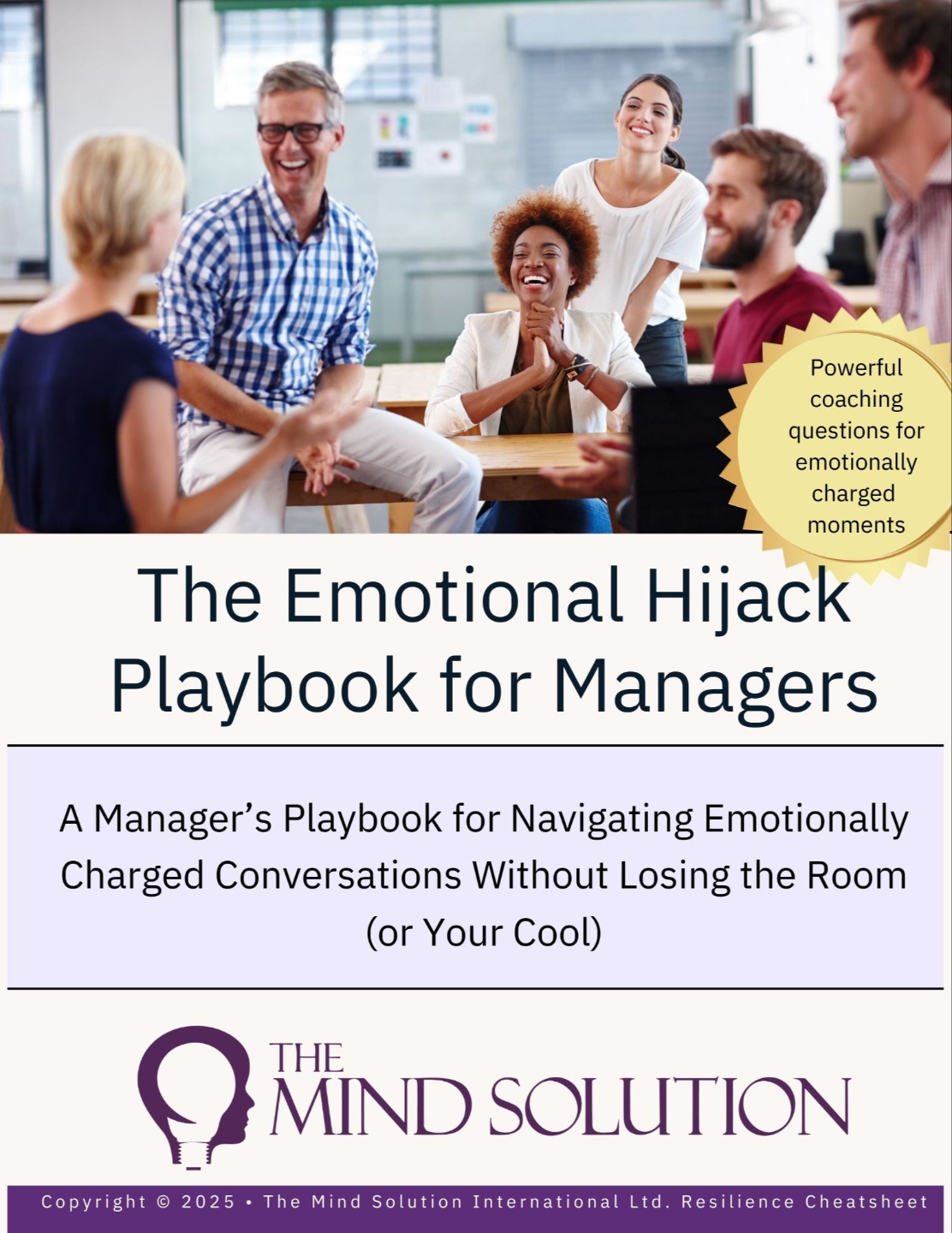Why HR Leaders Must Prioritise Workplace Wellbeing Now
Mar 01, 2022
It's Time to Put Workplace Wellbeing at the Top of The Agenda
True functional experts in recruitment, policy and process; compliance; performance, employee relations, and HR leadership have significantly evolved since the days of ‘personnel’.
Added to this, the global pandemic combined with the emerging future of a new hybrid working model that requires both a whole new infrastructure and employee experience, sees HR professionals stepping into an even greater strategic role to support organisations moving forward.
As new ways of working have yet to solidify as solid structures, HR and leadership teams are responding to the backlash of what the global pandemic has created.
Never was there a better time to sit and reflect on what matters when you're locked in your home with nowhere to go and no one to see, unless you were two metres apart from one another!. The headspace that is often lacking in today’s modern world has seen people bring into question what they value and what they want from their employers, and what we saw was wellbeing in the workplace come into the spotlight.
This was further compounded by the relationship people had with their employers during the height of the pandemic. The 2020 Future of Work and Digital Wellbeing report by The Economist highlighted that increased connectivity meant employees could be contacted more frequently in a range of different ways. While this was seen to be a plus for communication, over half of the interviewees indicated struggling to switch off from work, leading to a rise in mental health issues.
Managing Mental Health in a Remote Environment
Managing teams of people in a remote environment was one of the biggest factors that leaders found themselves faced with during lockdown. And with the new hybrid working model, it continues to face challenges, calling for a new set of leadership skills.
Almost half of the respondents in the EIU survey said they still struggle with aspects of their jobs involving engaging with others online. These included difficulty coordinating multiple people’s inputs (48%), reading personal cues (38%) and building rapport (32%).
This new set of leadership skills comes with a new mindset and way of communicating, and without this evolution in leadership, teams will risk the effectiveness, productivity, and engagement of teams in this new world.
This potent combination has brought with it changes to the psychological contract. The psychological contract is the unwritten expectations that always operate between an employee and an organisation.
Instead of more traditional terms and conditions such as salary and promotional prospects influencing the psychological contract, people are using an organisation’s purpose, the way they treat their people, kindness, and sustainability as key criteria to evaluate ‘do I stay, or do I go?’.
Evidence of this is being witnessed in the ‘great resignation’. Having spent the last 18 months living in a place of uncertainty and survival, people were not in a position to make rational and informed decisions about their future careers and life purpose.
Fast forward to now, and people’s confidence to follow through on the decisions they made about their life, purpose and place of work has risen. Many describe how the ‘foot on the gas’ way of working is not sustainable, and burnt-out and fatigued resignation letters are landing in email inboxes around the globe.
Ultimately, dissatisfaction does to relationships what rust does to cars.
People will forget what you said, will forget what you did, but they will never forget how you made them feel. - Maya Angelou
In a recent white paper on The Future of Work, January 2022, 63% of 1,042 respondents globally reported being unhappy in their work. And 55% indicated their mental health was ‘low’ or ‘so-so’.
Alarming figures such as these call for radical action in the form of a well-thought-out, comprehensive wellbeing strategy.
The Future of Workplace Wellbeing
Rewind 10 years and wellbeing in the workplace was likely to extend to subsidised gym membership, a travel-to-work scheme and possibly some free fruit.
In the year ahead, as working from home becomes more common and our lives grow more interconnected than ever, there will be even greater focus upon mental health alongside physical health and wellbeing
Sir Richard Branson.
Wellbeing and mental health at work are now on the strategic agenda of any savvy leadership team meeting.
After being treated as a “benefit” or a part of the company’s EAP program for years, corporate wellbeing has now become a business strategy. CEOs and business leaders at all levels now recognize that if people are not productive, energetic, rested, and safe they simply will not perform
Josh Bersin, Global Industry Analyst
Burnout and fatigue are two key crisis areas HR and leadership are having to address. In 2019, the World Health Organisation recognised workplace burnout as an “occupational phenomenon.” It was the first time the global health agency directly linked burnout to its classifications of diseases as a work hazard.
The impact of burnout was observed when Nike closed offices for a week in August 2021 to give employees a ‘mental health break’. The dating app, Bumble, closed offices in June 2021 to give ‘burnt-out’ staff a week’s break.
Employee Wellbeing Strategy
The last two years have undoubtedly seen a rise in organisations investing in wellbeing; however, employee wellbeing in the workplace is a new arena for both HR and leadership. Getting under the skin of what people need requires a working knowledge of the mind and body. With this knowledge, an employee wellbeing strategy can be developed which meets both the needs of people at a mental, emotional and physical level and also creates the desired impact on the organisation.
The world of workplace wellbeing is vast, and without specialist skill and knowledge in the form of a wellbeing consultant, leaders run the risk of delivering initiatives which fall short of the mark. Mental health alone covers everything from stress and burnout to addiction, depression, alcoholism, schizophrenia, and suicide. Not to mention multiple personality disorder, self-harming and eating disorders.
Not every organisation will require an employee wellbeing strategy that addresses all aspects of the spectrum when it comes to health. HR can play a vital role in reviewing the analytical data to highlight what the key priorities are. Data such as HR stats, exit interview feedback and employee engagement feedback, for example, can help to shape and form an employee wellbeing strategy.
This data also plays a crucial role in enabling the business to measure the effectiveness of different initiatives and interventions. For example, investing in management mental health awareness training is on most organisations’ agendas; however, measurement of the effectiveness of the training is as important as the training delivery itself.
Leaders leading the way in creating a workplace wellbeing culture
Closing offices for a week to give burnt-out staff a break is neither strategic nor commercial. The leading edge of employee wellbeing is emerging as the creation of a prevention-over-cure approach, and this is where leadership have a key role to play in reviewing organisational culture.
All the same, this does not involve telling staff to “stop playing the victim card” and “moaning” about working conditions, which is what Bill Michael, Chairman of KPMG did on a virtual town hall in January 2021. Michael resigned a few days later.
In toxic cultures, being a workaholic is normalized and sacrificing sleep is glorified. The best way to get ahead is to burnout. In healthy cultures, quality of life is expected and having a life is celebrated. You’re encouraged to put your wellbeing above your work
Adam Grant
Leaders are cited as wanting a culture of high performance, yet some have not fully grasped the link between high performance and wellbeing. Leaders like Michael need to recognise that people don’t show up for work as a job title, they show up as human beings.
The old school model of high performance was performance = capacity + knowledge. People had a capacity for sales, a capacity for playing tennis, a capacity for accounting and so on. The model indicated that taking capacity for the subject area and adding knowledge equalled performing at a higher level.
Timothy Gallway later came along and gave us a new insight into high performance. Gallway created a formula that performance = capacity – interference. In other words, to perform at a high level there is no interference in the system in the form of environmental factors and internal factors – mainly the mind.
Given that the unconscious mind controls around 95% of the way people think, behave, and emotionally respond to situations, it’s easy to see that a person’s state of mind has a lot to do with high performance – and wellbeing, creating an even stronger business case to invest in a comprehensive wellbeing strategy.
Employee Wellbeing - A New Type of Leader is Emerging
The new psychological contract for employees calls for leaders in the C-suite to listen, empathise and be willing to show their own vulnerability.
Leaders with empathy do more than sympathize with people around them: they use their knowledge to improve their companies in subtle, but important ways
Daniel Goleman
Now, more than ever, sees a need to build and grow these skills among leaders for the future survival of an organisation. Leaders’ ability to manage remote teams and to empathise and connect with their people has to be one of the key pillars of an organisation’s wellbeing strategy.
Especially right now, when we’re so anxious and there’s so much vulnerability and uncertainty, we need to do more than diversity and equity and inclusion. We need to create real belonging in our culture. - Brene Brown
While the role of HR has changed, it’s evident that wellbeing is no longer viewed as an HR issue. There is a recognition that it is a key driver of business success, and as such, C-suite leaders and CEOs play a key role in crafting an employee wellbeing strategy, role modelling it and finally ensuring accountability for it.
Need a helping hand to develop your employee wellbeing strategy? Get in touch to find out how our workplace wellbeing consultancy can support you.
The Emotional Hijack Playbook For Managers
A Manager’s Free Resource for Navigating Emotionally Charged Conversations Without Losing the Room (or Your Cool).
Perfect to use in your next one-to-one.







